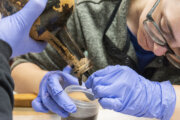BEIRUT — The measures taken by governments and hospitals in response to the COVID-19 pandemic in many cases led to delays or interruptions in treatment for children with cancer, a recently released study found.
The survey conducted in April by the Pediatric Oncology East and Mediterranean Group — a collaboration of institutions in the Middle East, North Africa, and West Asia working on pediatric cancer treatment — collected data from 34 centers in 19 countries on the measures they had taken in the face of the pandemic and the resulting impacts on treatment.
At the time, many countries were in some form of lockdown and medical centers in many cases restricted visits to only the most essential out of concern about spreading the virus and reallocated beds and resources to the COVID-19 response.
“Essential treatments, including chemotherapy, surgery, and radiation therapy, were delayed in 29% to 44% of centers, and 24% of centers restricted acceptance of new patients,” the report noted. “Clinical care delivery was reported as negatively affected in 28% of centers. Greater than 70% of centers reported shortages in blood products, and 47% to 62% reported interruptions in surgery and radiation as well as medication shortages.”
Apart from measures taken by the hospitals, the report noted that in some cases patients’ families refused to show up for essential visits out of fear or contracting the virus. In other cases, they were unable to make it to appointments because of restrictions on movement or on public transportation.
The researchers noted that delays in treatment could have a detrimental effect on the young cancer patients.
[MORE: Fleeing Bombs to Battle Cancer]
“Mechanisms to approach childhood cancer treatment delivery during crises need to be re?evaluated, because treatment interruptions and delays are expected to affect patient outcomes in this otherwise largely curable disease,” they wrote.
U.S. News & World Report spoke with Dr. Sima Jeha, director of the Eastern Mediterranean region for St. Jude Global and one of the authors of the report. Excerpts of the interview are below. The interview has been edited for length and clarity.
The report talks about a lot of ways that treatment was impacted by the COVID-19 situation. From your perspective, what were the most concerning findings?
This was very early on (in the pandemic) when we sent the survey, and everyone was focused on the (pediatric cancer) cases that actually contract COVID and what was the effect on the cancer patients who contracted COVID. We started thinking about what’s the effect on the children with cancer who don’t have COVID and what’s the effect on care, because childhood cancer is very curable, but it’s curable if you keep the treatment on time and you follow the protocols.
The thing that’s concerning is not just in the region; it’s everywhere. In the beginning, people started being scared and thinking, “We will hold the treatment and this will pass.” The concern was that holding the treatment even for two months, or even decreasing it, might not be good in the long term.
Did you notice if there were any main factors that seemed to play into whether a hospital had a lot of difficulty providing treatment during this period?
Very few hospitals said it didn’t affect the care at all, and we need to go back and check why. We think that most of the (cases where the) impact was low on the hospitals was because they didn’t really have (COVID) cases at the time, because the cases, for some reason, in the Middle East were very low for a long time, except for Iran. It would be good to see now that the surge happened whether the answer would still be that there’s no impact.
In cases where treatment was delayed, how much impact might that have on the outcomes for children with cancer?
It depends, really, on several things. It depends on what phase of treatment (the delay) was and for how long it was. If the kids are going to relapse because of that they will not do it immediately — they will do it in a year or two, so this is why we need to follow up for next year or two or even beyond. We are starting to collect (data) under St. Jude about how much chemo was missed and what phase of treatment it was.
Now that there has started to be tracking of children who were undergoing treatment for cancer and then got COVID, have there been any findings so far as far as what the mortality rate is or how that impacts the outcomes?
We have just started and (the data) are not fully analyzed and we are still collecting them, but so far, it’s reassuring that even the kids who get (the virus) can continue the treatment. If they are positive but they are not sick, you can continue the treatment or if you want to hold it, hold it for one week and not more and continue, and those kids for the major part are doing OK.
So, it’s better to continue with treatment than to keep the child away from a hospital because you don’t want to risk them getting COVID?
It’s not just the fact of getting them into the hospitals, but the worry in the beginning was, if they have COVID and COVID is an immunosuppressant and you give them chemo, they may get more sick because you are depressing their (blood) count and their immunity. So, the answer to that, again, is it depends what phase of therapy they’re in. If they are just diagnosed, there is no point in holding their chemo, because they have leukemia and their immune cells are down, so you need to treat the leukemia so they can form normal cells that can fight the infection. Although it’s tricky to do it, you have no choice, because if you don’t treat the leukemia, it will kill them.
The main thing is during induction, don’t delay, keep going. If they get sick and we see that it’s COVID, usually the recommendation is to hold the chemo for one week. We give them this break just to differentiate between what COVID is doing and what the chemo is doing and if they are stable, not worse, or recovered, then we resume the chemo as scheduled.
[MORE: Seeking Better Childhood Cancer Solutions Worldwide]
What do you think might be the lessons learned from COVID-19 when it comes to being prepared to handle or to continue to treat noncommunicable diseases during future pandemics?
I really think the key is coordination and messaging at the national level. You need to have a plan where there is no confusion across the geographic regions about what should be done. Connectivity is very important, real time, because everybody was learning at such a fast pace and we were changing guidelines as we go. It’s not wrong to change a guideline because if we learn something, we need to adapt.
Every country or city needs to know what the capacity is; for ventilators, PPE, for everything, and they need to coordinate so when the surge happens, they are ready.
Really in the (Eastern Mediterranean) region, I thought there would be much more confusion, but they were ready before they were hit, so I hope this will continue.
Are there any other particular findings from the report that you’d like to highlight?
When there is a pandemic the effect is not just from the pandemic itself, from the virus itself, but also it affects the health care system because it really interacts with the care of other diseases. Some of them are very curable but can be fatal if not treated.
If we want to show statistics for all the other areas that are affected in the health care system, the impact is huge, the impact is very costly and everything should be connected, like taking care of controlling this infection so it doesn’t trickle down to more morbidities and more mortalities that are due to a health care system that’s overwhelmed and not able to cope.
More from U.S. News
In Lebanon and Jordan, Fleeing Bombs to Battle Cancer
10 Countries With the Most Well-Developed Public Health Care Systems
The 25 Best Countries in the World
Study: Coronavirus Response Delayed Some Childhood Cancer Treatments originally appeared on usnews.com







